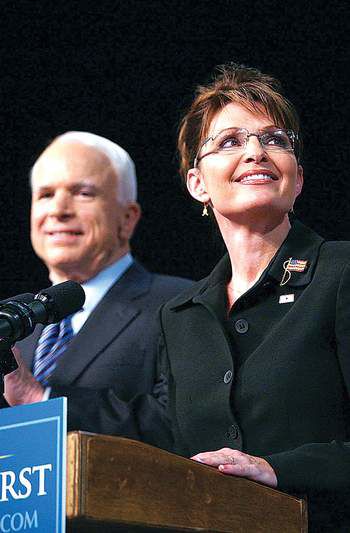McCain-Palin ticket debuts
Published 5:00 am Saturday, August 30, 2008

- Alaska Gov. Sarah Palin appears with Republican presidential candidate John McCain after he introduced her as his running mate Friday morning during a rally in Dayton, Ohio. “She stands up for what’s right, and she doesn’t let anyone tell her to sit down,” McCain said. “She’s exactly who I need.” Palin told the Ohio audience: “I didn’t get into government to do the safe and easy things. A ship in harbor is safe, but that’s not why the ship is built.”
DAYTON, Ohio — In a surprise move, John McCain announced here Friday that he had chosen Gov. Sarah Palin of Alaska as his running mate, shaking up the political world at a time when his campaign has been trying to attract women, especially disaffected supporters of Sen. Hillary Clinton.
“I’m very happy today to spend my birthday with you, and to make a historic announcement in Dayton,” said McCain, who turned 72 on Friday, explaining that he had been looking for the running mate who can “best help me shake up Washington.”
In choosing Palin — a 44-year-old conservative and mother of five who has been governor for less than two years — the McCain campaign reached far outside the Washington Beltway in an election in which the Democratic presidential nominee, Sen. Barack Obama, is running on a platform of change.
“She’s not from these parts, and she’s not from Washington, but when you get to know her, you’re going to be as impressed as I am,” McCain said as he introduced Palin to a crowd estimated by his campaign to be 15,000 at the Ervin J. Nutter Center here.
Palin then took the stage with her husband, Todd, who owns a commercial fishing business, and four of their five children. She said her eldest child, a son, is in the Army, and he is heading to Iraq on Sept. 11.
She described herself as “just your average hockey mom,” who joined the PTA, was elected to the City Council, then served as mayor and as governor, adding that she did not get into government to take the safe course.
“A ship in harbor is safe, but that’s not why the ship is built,” Palin said, adding that she would “challenge the status quo to serve the common good.”
Palin praised the achievement of Clinton, who lost a long and bitter primary race against Obama, saying that she had left “18 million cracks” in the highest glass ceiling in the land.
Then, making an explicit appeal to Clinton’s disappointed supporters, she said, “It turns out that the women in America aren’t finished yet, and we can shatter that glass ceiling.”
Palin, a former mayor of the small town of Wasilla, an Anchorage suburb, and one-time beauty pageant queen, first rose to prominence as a whistle-blower uncovering ethical misconduct in state government.
The selection amounted to a gamble that an infusion of new leadership — and the novelty of the Republican Party’s first female candidate for vice president — would more than compensate for the risk that Palin could undercut one of the McCain campaign’s central arguments, its claim that Obama is too inexperienced to be president.
The choice of Palin stands in sharp contrast to the selection of the Democratic vice presidential nominee, Sen. Joe Biden of Delaware, a veteran lawmaker and chairman of Senate Foreign Relations Committee.
But Palin ran as a change agent when she was elected as governor of Alaska in 2006, and in a move that might have appealed to McCain, she took intense criticism from members of her own party for turning the spotlight on the failures of Alaska Republicans, some of whom had been beset by corruption scandals.
She was elected Alaska’s chief executive after fighting off a comeback bid by a former Democratic governor. Her victory came after she had helped uncover misconduct in the administration of Gov. Frank Murkowski, whom she later trounced in a Republican primary.
Palin opposes abortion rights, which could help pacify social conservatives in a party whose members were wary as rumors swirled that McCain might pick a running mate who did not.
But she differs with McCain on a controversial environmental issue that centers on her home state: She has been pushing for a new pipeline that would pump trillions of cubic feet of natural gas from the North Slope to the lower 48 states in the hope of delivering Alaska another economic boom. McCain’s opposition to drilling — even after he changed positions and began advocating for offshore oil drilling — has upset many Republicans.
The choice of Palin was a closely guarded secret, and she flew under the political radar for months as McCain searched for a running mate. Much of the public discussion in recent days had focused on Mitt Romney, the former Massachusetts governor and McCain’s one-time rival for the Republican nomination; Gov. Tim Pawlenty of Minnesota; Tom Ridge, the former governor of Pennsylvania and Homeland Security secretary; and Sen. Joseph Lieberman of Connecticut, the Democrat-turned-independent who was former Vice President Al Gore’s running mate in 2000. Social conservatives were relieved and highly pleased.
“They’re beyond ecstatic,” said Ralph Reed, the former head of the Christian Coalition. “This is a home run. She is a reformer governor who is solidly pro-life and a person of deep Christian faith. And she is really one of the bright shining new stars in the Republican firmament.”
The confirmation of McCain’s selection of Palin came barely an hour before he was to introduce her to the nation here and at the end of a chaotic and at times comic morning of media reports that veered from possibility to possibility. The two men who been widely reported as recently as Thursday evening to be on McCain’s short list — Romney and Pawlenty — were eliminated by midmorning Friday.
Attention then turned to reports that a chartered Gulfstream jet had arrived near Dayton from Anchorage late Thursday, suggesting that Palin was on it.








